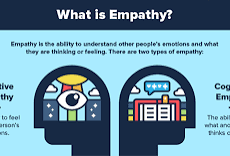Affective and Cognitive Empathy: Understanding the Differences
Empathy, the ability to understand and share the feelings of another, plays a crucial role in human interactions and relationships. Within the realm of empathy, two distinct forms are often discussed: affective empathy and cognitive empathy.
Affective Empathy
Affective empathy, also known as emotional empathy, refers to the capacity to resonate with another person’s emotions. It involves feeling what another person is feeling, experiencing a shared emotional response. When you witness someone in pain and you feel a sense of distress or compassion in response, that is affective empathy at work.
Cognitive Empathy
In contrast, cognitive empathy involves understanding another person’s perspective and emotions without necessarily sharing their feelings. It requires putting yourself in someone else’s shoes and intellectually grasping their thoughts and emotions. Cognitive empathy allows for a more objective understanding of another person’s experiences.
The Interplay Between Affective and Cognitive Empathy
While affective and cognitive empathy are distinct concepts, they often work together to enhance our overall empathetic abilities. Affective empathy can create an emotional connection with others, fostering compassion and support. On the other hand, cognitive empathy enables us to navigate complex social situations by understanding different viewpoints.
The Importance of Balancing Both Forms of Empathy
Having a balance of affective and cognitive empathy is essential for building strong relationships and fostering understanding in diverse contexts. Affective empathy helps us connect emotionally with others on a deeper level, while cognitive empathy allows us to consider multiple perspectives and make more informed decisions.
In Conclusion
Understanding the distinctions between affective and cognitive empathy can enhance our interpersonal skills and contribute to creating a more empathetic society. By cultivating both forms of empathy, we can develop stronger connections with others and promote mutual respect and compassion in our interactions.
Understanding Affective and Cognitive Empathy: Key Questions and Insights
- What is affective empathy?
- How does affective empathy differ from cognitive empathy?
- Can you provide examples of affective empathy in daily life?
- What is cognitive empathy and why is it important?
- How can one develop affective empathy skills?
- In what ways do affective and cognitive empathy complement each other?
- Are there differences in how affective and cognitive empathy are processed in the brain?
- What role do affective and cognitive empathy play in building strong relationships?
What is affective empathy?
Affective empathy, often referred to as emotional empathy, is the ability to understand and share the feelings of another person. When experiencing affective empathy, individuals are able to resonate with the emotions of others, leading to a shared emotional response. This form of empathy allows individuals to connect on a deeper level by feeling what another person is feeling, whether it be joy, sadness, or distress. Affective empathy plays a crucial role in fostering compassion, building relationships, and providing support to those in need.
How does affective empathy differ from cognitive empathy?
A common query regarding empathy often revolves around the distinction between affective and cognitive empathy. Affective empathy involves sharing and resonating with another person’s emotions, experiencing a parallel emotional response. On the other hand, cognitive empathy centres on understanding someone else’s feelings and perspective without necessarily feeling the same emotions. While affective empathy focuses on emotional connection and compassion, cognitive empathy emphasises intellectual comprehension and perspective-taking. Both forms of empathy play vital roles in interpersonal relationships and societal interactions, offering unique pathways to understanding and connecting with others on emotional and cognitive levels.
Can you provide examples of affective empathy in daily life?
In daily life, examples of affective empathy can be observed in various situations where individuals respond emotionally to the feelings of others. For instance, when a friend shares their joy over a personal achievement, and we genuinely feel happy and excited for them, that demonstrates affective empathy. Similarly, comforting a loved one who is going through a difficult time and sharing in their sadness or offering support showcases affective empathy in action. These instances illustrate our ability to connect with others on an emotional level and show compassion and understanding towards their feelings.
What is cognitive empathy and why is it important?
Cognitive empathy, a fundamental aspect of empathy, involves the ability to understand and comprehend another person’s thoughts, emotions, and perspective without necessarily sharing their feelings. It enables individuals to put themselves in someone else’s shoes, gaining insight into the motivations and experiences of others. Cognitive empathy is crucial in fostering effective communication, building meaningful relationships, and navigating social interactions with sensitivity and understanding. By developing cognitive empathy, individuals can enhance their emotional intelligence, demonstrate empathy towards others more effectively, and contribute to creating a more empathetic and compassionate society.
How can one develop affective empathy skills?
Developing affective empathy skills involves cultivating a deeper emotional understanding of others and building a stronger connection with their feelings. One effective way to enhance affective empathy is through active listening and genuine engagement with others’ emotions. By practising empathy in daily interactions, such as showing compassion and validating others’ feelings, individuals can gradually strengthen their ability to resonate with and respond to different emotional states. Additionally, engaging in activities that promote self-awareness and reflection can help individuals develop a greater sense of emotional intelligence, enabling them to empathise more effectively with others. Ultimately, developing affective empathy skills requires patience, practice, and a willingness to engage empathetically with the experiences of those around us.
In what ways do affective and cognitive empathy complement each other?
In exploring the relationship between affective and cognitive empathy, it becomes evident that these two forms of empathy complement each other in significant ways. Affective empathy allows individuals to emotionally connect with others, fostering compassion and understanding through shared feelings. On the other hand, cognitive empathy enables individuals to understand different perspectives and emotions without necessarily experiencing them firsthand, promoting a more objective understanding of others’ experiences. Together, affective and cognitive empathy work in harmony to enhance our overall empathetic abilities, enabling us to form deeper connections with others while also gaining insight into diverse viewpoints and emotions.
Are there differences in how affective and cognitive empathy are processed in the brain?
Research suggests that affective and cognitive empathy involve distinct neural pathways and mechanisms in the brain. Affective empathy, which relates to emotional resonance with others, is associated with regions such as the amygdala and insula that play a role in processing emotions. On the other hand, cognitive empathy, involving understanding another’s perspective, is linked to areas like the prefrontal cortex responsible for higher-order thinking and perspective-taking. Studies indicate that these two forms of empathy are processed separately but can interact to influence our social interactions and relationships. Understanding the neural basis of affective and cognitive empathy sheds light on how we empathize with others and navigate complex social dynamics.
What role do affective and cognitive empathy play in building strong relationships?
Understanding the roles of affective and cognitive empathy is crucial in building strong relationships. Affective empathy allows individuals to connect emotionally with others, fostering compassion, understanding, and support. By sharing in someone else’s feelings and experiences, affective empathy creates a sense of closeness and empathy that is essential for building trust and intimacy in relationships. On the other hand, cognitive empathy enables individuals to understand different perspectives and emotions without necessarily sharing them. This form of empathy helps in navigating complex social interactions, resolving conflicts, and promoting effective communication. By balancing both affective and cognitive empathy, individuals can develop deeper connections with others, enhance mutual understanding, and foster harmonious relationships built on empathy and respect.



